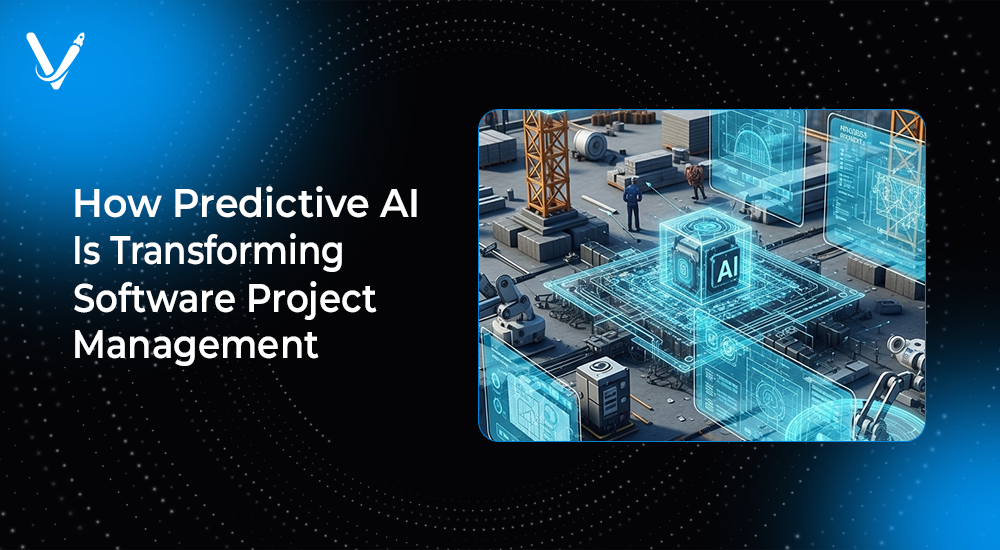How Predictive AI is Transforming Software Project Management


- Sep 22, 2025
Software project management has always been a delicate balancing act. Teams must deliver products on time, within budget, and with uncompromised quality, all while navigating uncertainties, shifting priorities, and evolving client demands. Traditional methods rely heavily on historical data, human intuition, and linear processes that often leave little room for anticipating the unexpected. As projects grow more complex and stakeholders demand faster results, organizations are looking for more proactive approaches to planning, monitoring, and execution.
This is where predictive AI steps in. By harnessing advanced algorithms, machine learning models, and intelligent data analytics, predictive AI brings foresight to project management. It doesn’t just track what is happening right now—it predicts what could happen next. Imagine knowing the likelihood of delays before they occur, spotting risks early enough to mitigate them, or optimizing resource allocation with confidence. These capabilities are not futuristic anymore; they are becoming central to how modern software projects are run.
This article explores in depth how predictive AI is transforming software project management. We will discuss its role in forecasting timelines, enhancing risk management, improving resource allocation, increasing productivity, and fostering better decision-making. You will also see how organizations like Vasundhara Infotech are driving this transformation and why businesses that adopt predictive AI will gain a decisive edge in delivering successful projects.
Software project management has moved through different eras. In its early days, projects were often managed with static methods such as Gantt charts, spreadsheets, and simple task-tracking tools. While these approaches provided structure, they offered limited adaptability. Projects frequently ran into delays, overspending, and miscommunication due to the inability to foresee issues before they escalated.
With the rise of Agile and Scrum methodologies, project management became more iterative and flexible. Teams gained the ability to respond quickly to changes, but even Agile frameworks depend largely on team experience and retrospective data. What they often lack is predictive intelligence to look beyond the present sprint and anticipate broader project outcomes.
Predictive AI represents the next major shift. By analyzing historical project data, behavioral patterns, and external variables, it introduces a forward-looking approach that supplements human judgment with machine-driven foresight. This evolution is not about replacing project managers but empowering them with the right tools to make faster, smarter, and more confident decisions.
Predictive AI refers to the use of artificial intelligence models and algorithms that identify future outcomes based on current and historical data. In project management, this translates to predicting project timelines, budget deviations, potential risks, or even the likelihood of achieving defined objectives.
These models rely on techniques like regression analysis, classification algorithms, natural language processing, and time-series forecasting. They process structured data such as timelines, budgets, and resources, as well as unstructured data like communication logs, emails, and project notes. With these inputs, predictive AI builds a comprehensive picture of how a project is unfolding and where it might lead.
For instance, a predictive AI system may detect that a project is at risk of delay because several critical tasks are dependent on a resource already overbooked. Or it may highlight that budget overruns are probable because past projects of a similar size and scope consistently underestimated testing efforts. This type of predictive insight helps managers act before problems escalate.
Planning is the foundation of every project, yet it often suffers from inaccurate estimations. Predictive AI enhances planning by analyzing past projects and identifying patterns that inform more accurate schedules, budgets, and milestones. Teams no longer have to rely solely on gut feelings or limited data; instead, they can create project plans that are data-driven and highly reliable.
AI-powered planning tools can simulate different scenarios, enabling managers to see the impact of changing priorities or adding new features. This allows for proactive adjustments, ensuring project plans remain resilient against shifting requirements.
Risks are inevitable in software projects, but predicting them has always been a challenge. Predictive AI models continuously monitor project variables to identify potential risks long before they materialize. This includes predicting resource bottlenecks, anticipating technical debt, or identifying communication breakdowns.
By flagging risks early, project managers can create mitigation strategies, allocate contingency resources, and avoid disruptions. For example, predictive AI can warn a team that unresolved bugs are likely to snowball into critical defects if not addressed within a given timeframe. This proactive approach reduces the element of surprise and ensures greater stability.
Resource management is one of the toughest challenges in software project management. Teams often face conflicts over skilled personnel, uneven workloads, and overcommitment. Predictive AI helps allocate resources more efficiently by analyzing availability, skills, workload history, and performance trends.
This allows managers to distribute tasks fairly, prevent burnout, and ensure that every resource is used optimally. Moreover, predictive AI can suggest when to bring in additional expertise or when to reassign tasks for better productivity. The result is higher team morale and better project outcomes.
Predictive AI also enhances collaboration by offering intelligent insights into team dynamics. It can identify communication gaps, predict which teams are likely to face delays, and suggest collaboration improvements. Some AI-powered platforms integrate seamlessly with project management tools like Jira, Trello, or Asana, providing real-time recommendations that keep teams aligned.
Increased productivity stems not only from streamlined processes but also from reduced uncertainty. When teams know what to expect and how to prepare, they can focus more on delivering value instead of firefighting issues.
Perhaps the most powerful advantage of predictive AI is its ability to drive decisions with data. Managers no longer need to rely on intuition or incomplete reports. Predictive AI aggregates information from diverse sources and presents it in a structured manner, offering recommendations based on probabilities and trends.
This transforms decision-making from reactive to proactive. Instead of reacting after an issue arises, managers can steer the project with foresight, ensuring smoother execution and higher chances of success.
The adoption of predictive AI is already visible in multiple industries, and software project management is no exception. Large enterprises, startups, and service providers are leveraging AI to optimize project delivery.
Some organizations use predictive AI to monitor code repositories and identify patterns that may indicate rising technical debt. Others integrate AI into DevOps pipelines to predict system failures before deployment. In client-facing environments, predictive AI analyzes customer requirements and historical contract data to ensure proposals are realistic and achievable.
At Vasundhara Infotech, we have witnessed firsthand how predictive AI elevates project management outcomes. By embedding predictive models into our workflows, we provide clients with transparent timelines, risk assessments, and optimized resource strategies. This proactive approach ensures that projects are delivered on time, within budget, and aligned with business goals.
Predictive AI offers a multitude of benefits that extend across every aspect of software project management.
It strengthens visibility by unifying data across multiple platforms into a centralized dashboard, offering a holistic view of project health. It accelerates problem resolution by detecting issues before they escalate, reducing mean time to recovery. It reduces costs by minimizing rework, delays, and resource mismanagement. It enhances client satisfaction by delivering projects more predictably and with greater quality. And it enables scalability, ensuring that as projects grow in size and complexity, management practices remain robust.
Each of these benefits contributes to a competitive edge in today’s fast-paced software landscape. Businesses that integrate predictive AI into project management are better positioned to deliver innovation consistently and confidently.
Despite its advantages, adopting predictive AI in project management comes with challenges. Data quality remains a critical issue, as inaccurate or incomplete data can distort predictions. Organizations must also overcome resistance to change, as project managers and teams may be hesitant to trust machine-generated insights over their own experience.
Additionally, predictive AI requires robust infrastructure and skilled personnel to implement effectively. Companies must ensure they have the technical capabilities and cultural readiness to embrace AI-driven practices. However, with proper training, gradual implementation, and transparent communication, these challenges can be overcome.
As predictive AI technologies continue to evolve, their impact on software project management will only deepen. We can expect tighter integration between AI and project management platforms, enabling seamless workflows. Predictive models will become more sophisticated, capable of accounting for complex interdependencies and external factors like market shifts or regulatory changes.
In the future, predictive AI could even act as a co-pilot for project managers, offering real-time advice and automatically adjusting plans as conditions change. Far from replacing humans, this evolution will create a new synergy where human expertise and machine intelligence complement each other, driving unprecedented efficiency.
Predictive AI is not just another tool in the project manager’s toolkit—it is redefining how software projects are envisioned, planned, and executed. By delivering foresight, predictive insights, and data-driven recommendations, AI empowers organizations to navigate complexity with confidence.
For businesses, adopting predictive AI means moving beyond reactive problem-solving toward proactive, intelligent management. It ensures greater predictability, stronger risk management, optimized resources, and improved client satisfaction. As technology continues to advance, the organizations that embrace predictive AI will set the standard for successful project delivery.
At Vasundhara Infotech, we believe that predictive AI is the key to building smarter, more resilient projects. Our AI-driven solutions are designed to help businesses achieve faster results, reduce risks, and scale with confidence. If you are ready to take your project management practices to the next level, our team is here to guide you. Get in touch with us.
Copyright © 2026 Vasundhara Infotech. All Rights Reserved.
